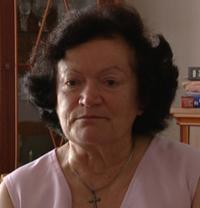There is only one thing I wish for: to never let totalitarianism, the reign of violence and terror, rule in the future The real events and hard lives preserved on the pages of our history and in memory of the nation ought to serve as a memento for future generation

Download image
Margita Zimanová, nee Valentová was born on February 9, 1942, in Bratislava. She was the eldest daughter of political prisoners. Her father worked in the Ministry of the Interior and her mother was a housewife. Her parents were arrested on January 14, 1952, because they had helped her mother’s brother, Vojtech Danko, to flee across the border. Her mother, Margita Valentová, 32, was sentenced to life imprisonment. Her punishment was later shortened to 25 years. All in all she spent seven years in prisons; except her 9-month stay in Bratislava, she also experienced prisons in Rimavská Sobota, Pardubice and Želiezovce. Her father, Pavel Valent, 39, was sentenced to death and on March 28, 1953, he was executed. So far none of the family has known what happened to his body and where he was buried. Her family was deprived of all the property which was confiscated and put up for auction. The grandparents looked after three little children, Gita, Helenka and Peter, in Ladomer. Her grandfather, Gabriel Danko, came to Bratislava to take food tickets for the children, but he was arrested and consequently he spent more than seven years in the jails in Příbram and in Jáchymov. Her mother’s brother, Imrich Danko, was also taken into custody. Vojtech Danko, because of whom the whole family suffered, had worked as a notary in Detva. Since he had expressed some disagreement with the ruling regime, he was in danger and therefore he decided to flee across the border to Austria. Margita’s father helped him to flee and, as a result, he was imprisoned and executed. Vojtech Danko tried to come back to homeland in 1968, but it was not possible because of the political situation. Parents of Margita Zimanová were sentenced and imprisoned for anti-state activity, so she was not allowed to study and thus she started to work when she was only fourteen. She, together with her siblings, suffered a lot not only in childhood when children shouted at her angrily and they stopped being friends with her, but also in adulthood when she had problems at work, when she was persecuted by the State Security members or even when she was suspected of writing an anti-state letter. She wishes everyone to tell the truth about events that happened in the 1950’s. Witnessing of people’s suffering ought to be a memento for future generation that should never let anything similar happen.
